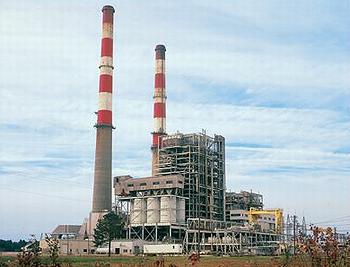
RALEIGH, North Carolina, March 12, 2015 (ENS) – North Carolina’s Department of Environment and Natural Resources has handed Duke Energy Progress a record penalty for environmental damages. The utility was fined $25.1 million for groundwater contamination from coal ash at the Sutton Plant on the Cape Fear River near Wilmington.
Under the North Carolina constitution, proceeds from Tuesday’s fine will go to a statewide fund for public schools.

Coal ash is the waste formed from burning coal in power plants to make electricity. The ash is stored in giant ponds near power plants, often adjacent to waterways. It contains toxic substances such as mercury, arsenic, lead and chromium.
The second largest industrial waste stream in the United States, the toxics in coal ash have been linked to heart disease, cancer, respiratory diseases and stroke.
DENR calculated the amount of Duke’s fine based on state laws that allow fines to be assessed for continuous violations of the state’s groundwater standards.
The coal ash pollutants that are considered the greatest public health risk, such as thallium, selenium, arsenic and boron, carried the stiffest penalties, state officials said.
“Today’s enforcement action continues the aggressive approach this administration has taken on coal ash,” said DENR Secretary Donald van der Vaart.
“In addition to holding the utility accountable for past contamination we have found across the state, we are also moving expeditiously to remove the threat to our waterways and groundwater from coal ash ponds statewide,” he said.
In September 2014, the Coal Ash Management Act became law in North Carolina, putting the state on a path to closing all the utility’s coal ash ponds.
The Sutton Plant began operation as a coal-fired electric generating station in 1954. The three coal units were retired in 2013 as a new natural gas-fired unit came online at the site.
In August 2014, DENR sent Duke Energy Progress a notice of violation and intent to enforce for Sutton, calling it “the legally required first step toward issuing the utility a fine for violations of the state’s groundwater contamination laws.”
That action followed the filing in 2013 of lawsuits that focused on stopping the violations at Duke Energy’s coal ash ponds.
State officials calculated the penalty by determining the number of days specific constituents exceeded a groundwater quality standard, multiplied by a daily penalty amount.
At Sutton, the state agency determined that Duke Energy allowed a host of coal ash contaminants to leach into the groundwater at the facility for years.
In November 2014, DENR reclassified Sutton Lake as a public resource instead of an industrial cooling pond. The lake, which receives coal ash wastewater discharges from the Sutton plant ash ponds, is now considered to be “waters of the state,” a classification that means the lake will be protected by more stringent water quality standards.
The reclassification followed a document review during which records were found indicating that while the water body met the legal definition for waters of the state, previous department leadership decided to disregard that determination.
As a result of the reclassification, the state agency gave Duke Energy 60 days’ notice that its wastewater discharge permit would be reopened. The reclassification may mean additional treatment conditions are placed in the discharge permit or other environmental permits will be required in the future to ensure the health of the lake.
The largest electric power holding company in the United States, Duke Energy has 30 days to respond to the fine and may choose to appeal it to the state’s Office of Administrative Hearings.
But the $25.1 million penalty could be followed by more state and federal fines imposed on Duke Energy for its handling of coal ash.

State groundwater violations at other Duke Energy facilities could result in additional fines against the utility.
On February 2, 2014, between 50,000 and 82,000 tons of coal ash and 27 million gallons of ash pond water waste were released at Duke Energy’s Dan River Steam Station near Eden, North Carolina.
Penalties for violations of the utility’s federal Clean Water Act permit will be addressed through an enforcement agreement DENR has established with the U.S. Environmental Protection Agency.
In December 2014 the EPA published the first federal regulations on coal ash. Although weaker than North Carolina’s Coal Ash Management Act, the rules do reinforce the responsibility of coal ash impoundment owners.
Today, House Republicans released draft legislation that they said would add certainty to the EPA’s coal ash disposal rules.
Sponsored by Congressman David McKinley, a West Virgina Republican, the measure would build upon the EPA’s December rule, its supporters said.
McKinley’s bill would allow states to adopt the EPA standards and enforce them or stronger standards. The EPA would be able to set up enforcement programs in states that do not comply.
Citizens could still sue utilities, but McKinley’s bill would not require utilities to publicly disclose information about the coal ash ponds, as the EPA’s rule requires.
More than 200 contaminated sites and spills have been documented among the more than 1,400 coal ash waste dumps across the country, according to the public interest environmental law firm Earthjustice.
Copyright Environment News Service (ENS) 2015. All rights reserved.
© 2015, Environment News Service. All rights reserved. Content may be quoted only with proper attribution and a direct link to the original article. Full reproduction is prohibited.
